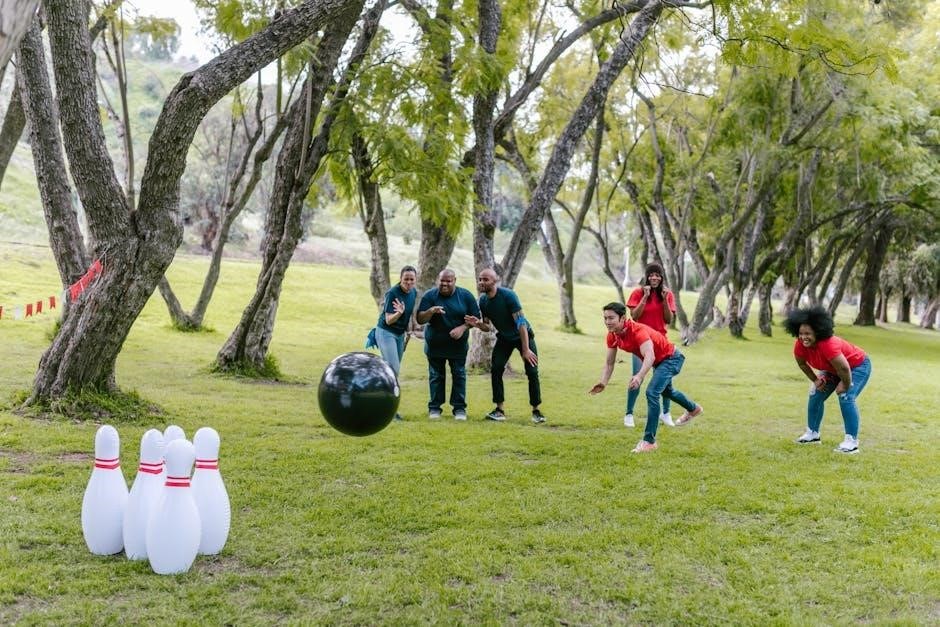social skills worksheets pdf

Importance of Social Skills in Daily Life
Social skills are essential for effective interactions, building positive relationships, and improving mental health. They enhance communication, empathy, and conflict resolution, fostering a harmonious and productive daily life.
How Social Skills Impact Relationships and Communication
Social skills significantly influence relationships and communication by fostering positive interactions and understanding. They enable individuals to express themselves clearly, interpret others’ emotions, and respond appropriately, reducing misunderstandings. Strong social skills promote empathy, active listening, and cooperation, which are crucial for building trust and rapport in personal and professional settings.
Effective communication is enhanced through verbal and nonverbal cues, such as body language and tone of voice. Social skills worksheets, especially in PDF format, provide structured exercises to improve these abilities, helping individuals navigate diverse social situations confidently and respectfully. By refining these skills, people can establish stronger, more meaningful connections and communicate more effectively in all aspects of life.
The Role of Worksheets in Teaching Social Skills
Social skills worksheets play a vital role in teaching and reinforcing positive interactions. They provide structured exercises to identify needs, practice listening, and understand nonverbal cues. Worksheets offer a clear framework for learning, making complex skills manageable and engaging. They also allow individuals to reflect on their actions and how they affect others, fostering self-awareness and improvement.
PDF worksheets are particularly effective due to their accessibility and ease of use. They can be customized to suit different learning needs, making them a versatile tool for educators and individuals alike. By breaking down social skills into actionable steps, worksheets help build confidence and competence in real-world scenarios.

Why Use Social Skills Worksheets in PDF Format?
Social skills worksheets in PDF format are preferred for their accessibility and convenience. They can be easily downloaded, printed, and shared, making them ideal for educators and individuals seeking structured exercises.
Accessibility and Convenience of PDF Worksheets
Social skills worksheets in PDF format are universally accessible and convenient. They can be easily downloaded, viewed, and printed using free software like Adobe Acrobat Reader. PDFs are compatible with all devices, making them ideal for educators, parents, and individuals. Their digital format allows for seamless sharing via email or online platforms; Worksheets can be printed multiple times, offering a cost-effective solution for repeated use. This accessibility ensures that anyone needing social skills development can benefit from these resources without additional costs or technical barriers, making learning and practice straightforward and efficient;
Customization Options for Different Learning Needs
Social skills worksheets in PDF format offer versatility to meet diverse learning requirements. Educators and parents can select specific exercises tailored to individual needs, such as focusing on listening skills or respect. Worksheets are adaptable for various age groups, from children to adults, and cater to special needs like autism. Some PDFs include multiple difficulty levels, allowing customization based on skill mastery. The ability to print and reuse worksheets ensures personalized learning experiences, making them a flexible tool for fostering social skills development in different settings and for varying learner needs.
Types of Social Skills Worksheets Available
Social skills worksheets are available for various age groups, including children, adolescents, teenagers, and adults. They also cater to special needs, such as autism, with tailored exercises.
Worksheets for Children and Adolescents
Worksheets designed for children and adolescents focus on age-specific social skills, such as communication, empathy, and cooperation. They include activities like identifying emotions, initiating conversations, and understanding social cues. Many resources are available in PDF format, offering exercises tailored to different developmental stages. These worksheets often incorporate visual aids and engaging tasks to make learning interactive; They also address common challenges, such as sharing, taking turns, and resolving conflicts. Free downloadable options provide accessible tools for parents and educators to support young learners in building strong social foundations. These resources are adaptable for both individual and group settings, fostering growth in school and beyond.
Worksheets for Teenagers and Adults
Worksheets for teenagers and adults focus on advanced social skills, such as effective communication, conflict resolution, and professional interactions. These resources, often in PDF format, provide exercises to refine skills like active listening, emotional regulation, and problem-solving. They cater to diverse needs, including workplace readiness and social etiquette; Activities may include role-playing scenarios, reflective journaling, and analyzing social situations. These worksheets are designed to help individuals navigate complex social dynamics, fostering confidence and adaptability in both personal and professional environments. They are easily accessible and printable, making them a versatile tool for continuous skill development.
Specialized Worksheets for Autism and Special Needs
Specialized worksheets for autism and special needs are tailored to address unique challenges, fostering social skill development through structured activities. These resources often include visual aids, step-by-step exercises, and repetitive practice to enhance understanding. They focus on skills like initiating conversations, interpreting nonverbal cues, and managing emotions. Many worksheets are adaptable to individual needs, offering varying difficulty levels. They provide a supportive framework for building confidence and improving interactions, helping individuals with autism or special needs navigate social situations more effectively and independently.
Effective Activities and Exercises in Worksheets
Effective activities include scenario-based exercises, nonverbal communication practice, personal goal setting, and collaborative tasks to enhance social interactions and emotional intelligence in structured formats.
Practicing Listening Skills and Reflective Listening

Worksheets often include exercises to enhance listening skills, such as identifying how actions affect others and following rules respectfully. Reflective listening activities encourage users to paraphrase and clarify statements, fostering understanding. These exercises help individuals develop active listening habits, improving communication and empathy. By practicing these skills, users can better navigate social interactions and build stronger connections. Worksheets may also include role-playing scenarios or sentence completion tasks to reinforce effective listening strategies. These tools are particularly useful for fostering clear and respectful communication in various settings.
Exercises on Following Rules and Being Respectful
Worksheets often feature exercises that teach the importance of following rules and demonstrating respect in social interactions. Activities include identifying appropriate behaviors, role-playing scenarios, and completing sentences about respectful communication. These exercises help individuals understand social norms and expectations, fostering positive interactions. By practicing these skills, users can improve their ability to navigate group settings and build meaningful relationships. The worksheets also emphasize the impact of actions on others, encouraging empathy and consideration in daily life. Such exercises are essential for developing a respectful and cooperative attitude in various social contexts.
Group Activities for Building Social Skills
Group activities in social skills worksheets are designed to foster collaboration and teamwork, helping individuals practice interpersonal interactions in a supportive environment. These exercises often include role-playing, brainstorming sessions, and problem-solving tasks that encourage active participation. By engaging in group work, participants learn to express themselves clearly, listen to others, and respect differing opinions. Such activities promote empathy, cooperation, and effective communication, making them invaluable for enhancing social skills in both children and adults. They also provide a platform to apply learned skills in real-life scenarios, reinforcing positive social behaviors and mutual understanding.

Identifying and Improving Personal Social Skills
Social skills worksheets help individuals identify strengths and areas for improvement through self-assessment tools and reflective exercises, fostering personal growth and better interpersonal interactions.
Self-Assessment Tools in Worksheets
Social skills worksheets often include self-assessment tools, allowing individuals to evaluate their own behaviors and communication styles. These tools, such as checklists or rating scales, help identify strengths and areas needing improvement. By reflecting on their interactions and emotions, users gain insights into their social habits. Worksheets may also include exercises like journaling or scenario analysis, enabling deeper self-awareness. This process fosters personal growth, helping individuals develop more effective and positive social behaviors in various settings, from personal relationships to professional environments.
Understanding Nonverbal Communication Techniques
Nonverbal communication, such as body language and facial expressions, plays a crucial role in social interactions; Worksheets often include exercises to identify and interpret these cues, helping individuals recognize how nonverbal signals impact relationships. Activities may involve analyzing scenarios, matching emotions with expressions, or practicing appropriate gestures. These tools enhance self-awareness and empathy, enabling better understanding of others’ feelings and intentions. Mastering nonverbal techniques fosters clearer communication, builds trust, and strengthens personal and professional connections, making it a vital skill for effective social engagement.

Applying Social Skills in Real-Life Situations
Social skills worksheets provide practical exercises for applying skills in real-life situations, enhancing daily interactions, job performance, and relationship-building abilities effectively today.
Creating a Good Impression in Various Settings
Social skills worksheets help individuals master techniques to create positive first impressions in diverse environments, such as workplaces, social gatherings, or educational settings. These resources often include exercises that guide users in understanding how their actions and words impact others, fostering respectful and considerate interactions. By practicing active listening, maintaining appropriate body language, and demonstrating empathy, individuals can enhance their ability to connect meaningfully and leave a favorable impression. These skills are crucial for building strong relationships and achieving both personal and professional goals effectively.
Communicating Effectively in Job and Social Environments
Social skills worksheets emphasize the importance of clear and respectful communication in both professional and social contexts. They provide exercises to improve verbal and nonverbal interactions, such as active listening, maintaining eye contact, and using appropriate body language. These tools help individuals express their thoughts confidently while understanding others’ perspectives. Effective communication fosters collaboration, resolves conflicts, and strengthens relationships. By practicing these skills, individuals can adapt seamlessly to diverse environments, ensuring successful interactions and building a positive reputation in both personal and professional settings.